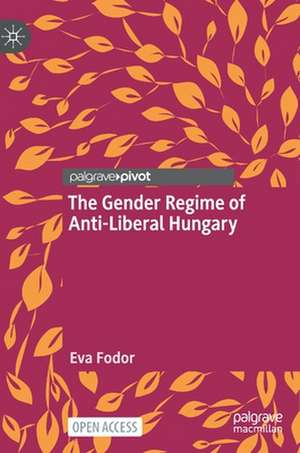The Gender Regime of Anti-Liberal Hungary
Autor Eva Fodoren Limba Engleză Hardback – dec 2021
Preț: 417.52 lei
Nou
Puncte Express: 626
Preț estimativ în valută:
79.89€ • 83.71$ • 66.05£
79.89€ • 83.71$ • 66.05£
Carte disponibilă
Livrare economică 21 martie-04 aprilie
Preluare comenzi: 021 569.72.76
Specificații
ISBN-13: 9783030853112
ISBN-10: 303085311X
Pagini: 128
Ilustrații: XI, 117 p. 4 illus. in color.
Dimensiuni: 148 x 210 mm
Greutate: 0.33 kg
Ediția:1st ed. 2022
Editura: Springer International Publishing
Colecția Palgrave Pivot
Locul publicării:Cham, Switzerland
ISBN-10: 303085311X
Pagini: 128
Ilustrații: XI, 117 p. 4 illus. in color.
Dimensiuni: 148 x 210 mm
Greutate: 0.33 kg
Ediția:1st ed. 2022
Editura: Springer International Publishing
Colecția Palgrave Pivot
Locul publicării:Cham, Switzerland
Cuprins
Chapter 1: Introduction.- Chapter 2: Against the “gender lobby”.- Chapter 3: “A pact with women”.- Chapter 4: Carefare.- Chapter 5: Conclusion.
Recenzii
“The focus in Fodor’s study on political economy and state welfare is novel and highly important. … the works by Fodor and by Graff and Korolczuk act as an important rejoinder to liberal feminist concepts of backsliding and backlash, which have largely grown up in Western scholarship. … these books provide an important reminder of the need for a political economic consideration of the anti-gender phenomenon.” (Jennifer Thomson, Politics & Gender, September 20, 2022)
Notă biografică
Eva Fodor is Professor of Gender Studies and Co-Director of the Democracy Institute at the Central European University located in Budapest, Hungary and Vienna, Austria. Her research focuses on gender inequalities in the labor market and social citizenship rights from a comparative perspective.
Textul de pe ultima copertă
This authoritative analysis of anti-liberal Hungary’s 21st century twist on “Kinder, Küche, Kirche” exposes its exploitation of women not only as unpaid carers in the home but also as a source of cheap paid labor. Fodor deftly links the Orbán regime’s notorious opposition to gender equality to its embrace of pronatalism, xenophobia, and expanded funding for church-based childcare and eldercare. A terrifying, essential read.
—Ruth Milkman, City University of New York Graduate Center and author of On Gender, Labor, and Inequality (lllinois, 2016) and Immigrant Labor and the New Precariat (Polity 2020)
Finally, a book that offers brilliant insight into the seemingly perplexing: the gender politics of the contemporary Hungarian state. With sharpness and wit, Fodor reveals how the public attack on gender--indeed, even on the concept of gender itself--goes hand-in-hand with the rise of authoritarian rule and right-wing populism. Giving this newgender regime a name, “the carefare state,” Fodor uncovers how it became so foundational to anti-liberal currents in Hungary. Part history of the present and part social policy analysis, The Gender Regime of Anti-Liberal Hungary makes an enormous contribution to understandings of anti-democratic politics, gender relations, and social inequality in Hungary and beyond.
—Ruth Milkman, City University of New York Graduate Center and author of On Gender, Labor, and Inequality (lllinois, 2016) and Immigrant Labor and the New Precariat (Polity 2020)
Finally, a book that offers brilliant insight into the seemingly perplexing: the gender politics of the contemporary Hungarian state. With sharpness and wit, Fodor reveals how the public attack on gender--indeed, even on the concept of gender itself--goes hand-in-hand with the rise of authoritarian rule and right-wing populism. Giving this newgender regime a name, “the carefare state,” Fodor uncovers how it became so foundational to anti-liberal currents in Hungary. Part history of the present and part social policy analysis, The Gender Regime of Anti-Liberal Hungary makes an enormous contribution to understandings of anti-democratic politics, gender relations, and social inequality in Hungary and beyond.
—Lynne Haney, Professor of Sociology, New York University, USA
Caracteristici
This book is open access, which means that you have free and unlimited access Explores the social—not merely the political—consequences of illiberalism A first attempt at describing key elements of the gender regime of illiberal rule Contributes to discussions on the nature and changes in gender inequality globally
